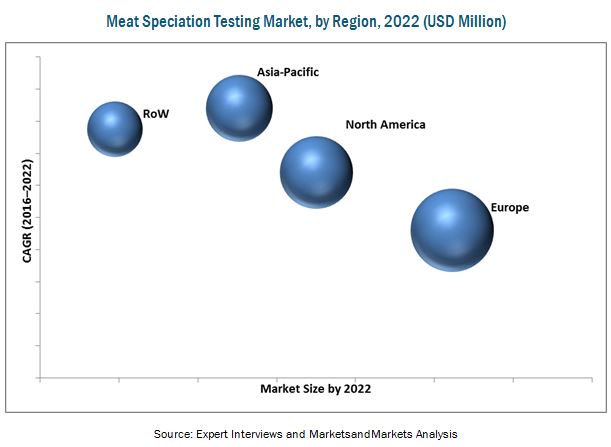The report “Meat Speciation Testing Market by Species (Bos Taurus, Sus Scrofa, Gallus Gallus, Equus Caballus, Ovis Aries), Technology (PCR, ELISA, Molecular Diagnostic), Form (Raw, Cooked, Processed), and Region – Global Forecast to 2022″, The meat speciation testing market is projected to reach USD 2,220.6 Million by 2022, at a CAGR of 8.20% from 2016. The market is driven by increase in number of adulteration and food fraud cases, religious beliefs, compliance with labeling laws, and stringent regulations and consumer demand for certified products.

Download PDF Brochure: https://www.marketsandmarkets.com/pdfdownloadNew.asp?id=245489571
The global increase in malpractices and the number of fraud and adulteration incidents for meat & meat products have resulted in the enhanced growth of this market. Thus, given the widespread cases of adulteration and food fraud, along with growing consumer concern for safety & quality, and with increasing stringency of regulations and their effective monitoring of the supply chain, the market for speciation testing is projected to grow at a significant rate in the upcoming years.
The meat speciation testing market, based on species, has been segmented into cow (Bos taurus), swine (Sus scrofa), chicken (Gallus gallus), horse (Equus caballus), sheep (Ovis aries), and other species such as turkey, goat, and rabbit. The chicken (Gallus gallus) segment is projected to grow at the highest CAGR among all species from 2016 to 2022. However, with the increasing prices of chicken, several meat manufacturers and processors are engaged in fraudulent practices and are involved in adulteration and fraudulent substitution of chicken with pork and other contaminating species. Several cases of chicken meat adulteration have been detected around the world, which is fueling market growth for the chicken (Gallus gallus) segment.
The global market, based on technology, has been segmented into PCR, ELISA, and other technologies (such as LC-MS/MS). The PCR segment is projected to be the largest and fastest-growing by 2022. Besides the market drivers, significant growth in adoption of this technology for meat speciation testing can be attributed to drawbacks of the ELISA (enzyme-linked immunosorbent assay) technology, wherein DNA analysis is conducted by the technology for accurate determination of meat species in products even at 0.1% levels of detection.
Speak to Analyst: https://www.marketsandmarkets.com/speaktoanalystNew.asp?id=245489571
The meat speciation testing market in the Asia-Pacific region is driven by various rules and regulations implemented by different countries in the region. Food security standards are getting stringent year-on-year to ensure safer supply of food to individuals in local and foreign countries.
This report includes a study of marketing and development strategies, along with the service portfolios of leading companies. It includes the profiles of leading companies such as VWR International LLC (U.S.), Eurofins Scientific SE (Luxemburg), ALS Limited (Australia), Neogen Corporation (U.S.), and LGC Science Group Ltd. (U.K.). Other players that are active in the industry are Genetic ID NA, Inc. (U.S.), International Laboratory Services Ltd. (U.K.), AB Sciex LLC (U.S.), Geneius Laboratories Ltd. (U.K.), and Scientific Analysis Laboratories (U.K.).
Target Audience:
- The stakeholders for the report are as follows:
- Meat traders
- Meat processors
- Meat speciation testing service providers
- Meat speciation testing laboratories
- Research & development (R&D) institutions
- Government organizations, research organizations, and consulting firms
- Manufacturers, importers & exporters, traders, distributors, and suppliers of meat speciation testing kits, and other related consumables

